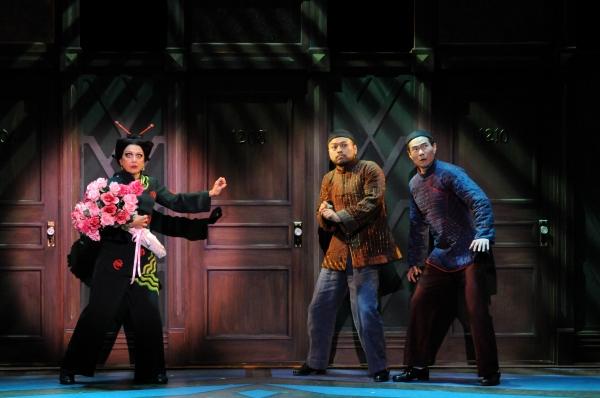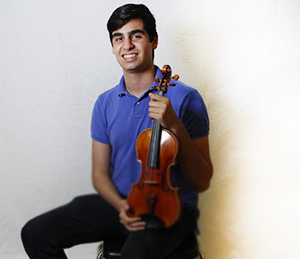
Ah, the 1920s: Jazz! Flappers! The Asian Exclusion Act of 1924!
“Thoroughly Modern Millie” (or “Thoroughry Modern Mirrie” in Mrs. Meers’ chopstick accent) has a racist streak. When I attended Thursday’s 25-minute preview of Dreyfoos’ production of the Broadway musical (which was intended for all students to see), the subplot and the peddling of outdated Chinese stereotypes horrified me. Students seated near me were passive and unapologetic, with some remarking, “Well, the play is from the 1920s, so…”
Well, actually, that’s incorrect: the play is set in the 1920s, but the script was written in 2000, based on source material from the 1967 film of the same name. That film also featured the same storyline with a white pimp masquerading as a Chinese hotel owner (complete in yellowface makeup) and her two Chinese henchmen selling the protagonist into white slavery. The henchmen (portrayed by Japanese-American actors Jack Soo and Pat Morita) were disparagingly credited as “Oriental #1” and “Oriental #2,” respectively. While the characters were given “Chinese-sounding” names in the Broadway adaptation, the term “Oriental” is still a sore spot in American society.
“When you call an Asian person ‘Oriental #1,’ especially in a school production, it’s incredibly offensive,” communications sophomore Michael Wang said.
Therefore, it’s safe to say that the movie version was controversial. It even featured a borderline anti-Semitic depiction of a Jewish wedding, which was conveniently excised in the stage adaptation. But considering that we’re not living in the ‘20s or even the ‘60s anymore, the inclusion of the Asian plotline almost 30 years following the movie’s release is a testament to the perpetuation of typecasting and stereotyping in the entertainment industry.
Stock characters and slapstick tropes have always existed in theatre, from Shakespearean comedies to even something as seemingly benign as the Disney Channel show “The Suite Life of Zack and Cody” (remember Esteban?). But ethnic stock characters have been tricky to write in an increasingly politically correct 21st century, despite their appearances in such Broadway classics as “West Side Story” and “The King and I.”
Stereotypes and racist jokes survive as nothing more than cheap laughs with little redeemable or intellectual qualities, as is the case in Dreyfoos’ production of “Thoroughly Modern Millie.” In several instances, they can even be hurtful, even if delivered under a pretext of “good fun,” or even out of the context of the larger work.
Many students, then, aren’t laughing.
“I was rather offended by the jokes and the informal way the sex slave trade in Asia was depicted,” strings senior Xin Yue Yuan said. “The sex slave trade is still a prominent issue in Southeast Asia and for this production to make it into a joke is just rude. I love everything else about the musical; I just think the Chinese stereotyping, racist jokes and the comedic way the sex slave trade were unnecessary and tasteless.”
Henchmen Ching Ho and Bun Foo (these names are not actually Chinese) are unnecessary caricatures of tired tropes (such as the submissive Asian stereotype). They call back to the historical marginalization of Asians as the psychological “Other” in the West. To quote from postcolonial philosopher Edward Said’s influential Orientalism:
“The Orient is the stage on which the whole East is confined. The Orient then seems to be, not an unlimited extension beyond the familiar European world, but rather a closed field, a theatrical stage affixed to Europe.”
Meyer Hall isn’t the only stage where such painfully gauche stereotypes may haunt concertgoers, however. Several students from Newton North High School in Massachusetts expressed their distaste of the stereotypes, prompting a community meeting in which the school’s theatre director apologized. The New Yorker ran a story in which a school production renamed Bun Foo and Ching Ho to the more innocuous “Brian” and “Charles,” and dropped altogether the Asian subplot. Meanwhile, The Boston Globe also reported several instances of schools performing edited or revised versions of “Thoroughly Modern Millie,” sans stereotypes.
While Dreyfoos may not boast as sizeable an Asian demographic as Newton North, the stereotypes do exceed the parameters of taste and therefore some sort of pre-show disclaimer (the solutions chosen by Newton North) would be a small step in recognizing the potential grievances in the characterizations of Bun Foo and Ching Ho, and, to a lesser extent, Mrs. Meers.
It’s a shame that the topic of stereotyping– one that some found merely innocuous and perhaps even humorous—could, for some students, possibly overshadow the brilliance of the stagecraft, production value, and dancing, among other theatrical elements. There are plenty of laughs to be had in the show, after all, but all outside the insensitive realm of the Hotel Priscilla’s laundry room.
“Several people have already come up to tell me that I’m overreacting and it was only meant to be humorous,” Yuan said. “If mocking one’s culture and laughing about it is funny then I guess I have no sense of humor.”



























































